Analysis of Ethical Issues in Business: Commonwealth Bank Case Study
VerifiedAdded on 2021/06/16
|12
|2757
|43
Essay
AI Summary
This essay delves into the ethical issues surrounding the Commonwealth Bank of Australia (CBA) money laundering scandal, examining failures in corporate governance, the role of key executives like Ian Narev and Matt Comyn, and the bank's interactions with regulatory bodies like AUSTRAC. The analysis covers the breaches of anti-money laundering laws, the implications for shareholders and stakeholders, and the ethical considerations of the bank's decision-making processes. The essay explores the application of moral philosophies, including individualistic-instrumental and interpersonal-normative morality, to the bank's actions, and the importance of ethical decision-making in business. It concludes by highlighting the consequences of unethical conduct and the need for businesses to prioritize ethical considerations alongside financial performance, emphasizing the importance of corporate social responsibility (CSR) and the morality of universalism in decision-making.
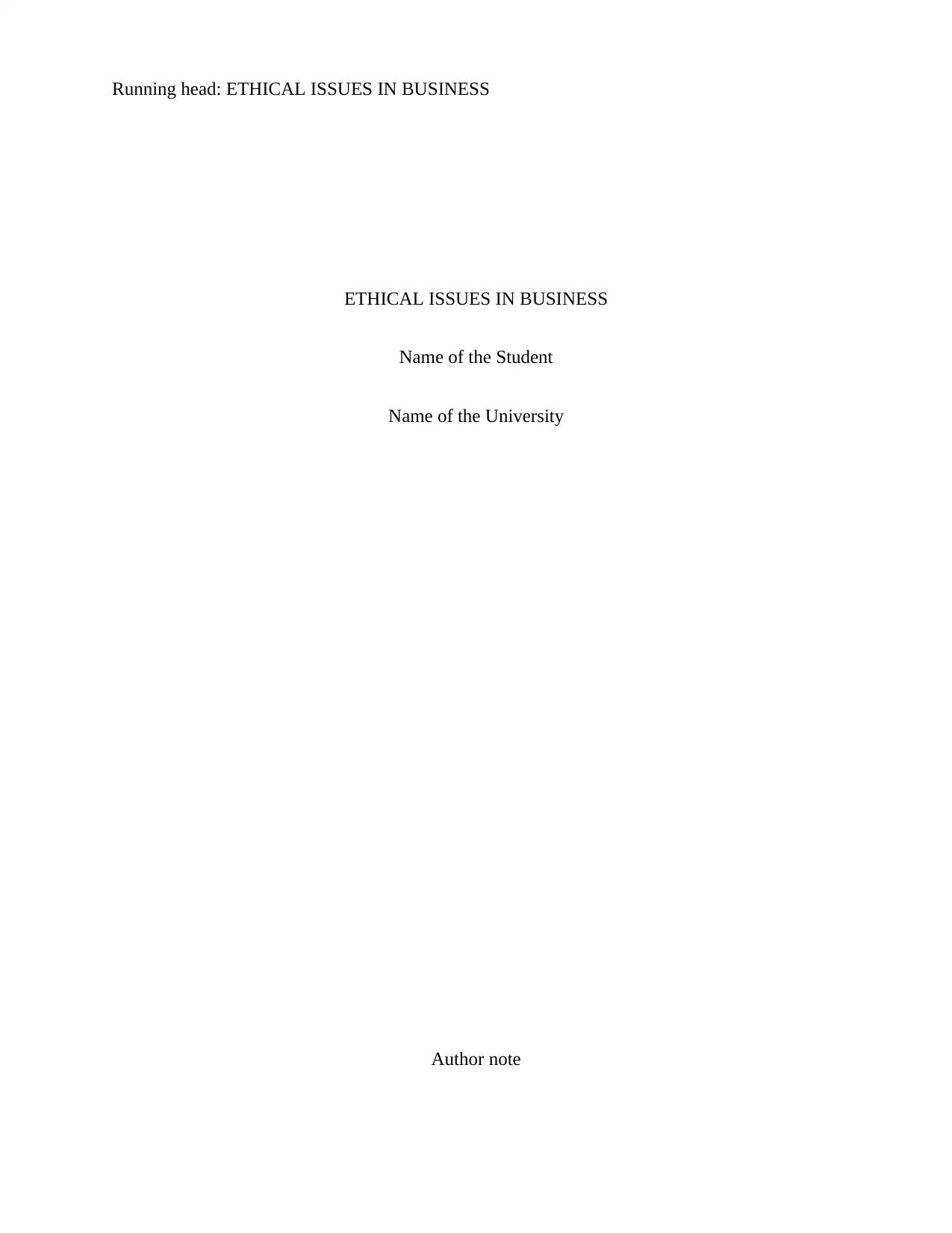
Running head: ETHICAL ISSUES IN BUSINESS
ETHICAL ISSUES IN BUSINESS
Name of the Student
Name of the University
Author note
ETHICAL ISSUES IN BUSINESS
Name of the Student
Name of the University
Author note
Paraphrase This Document
Need a fresh take? Get an instant paraphrase of this document with our AI Paraphraser
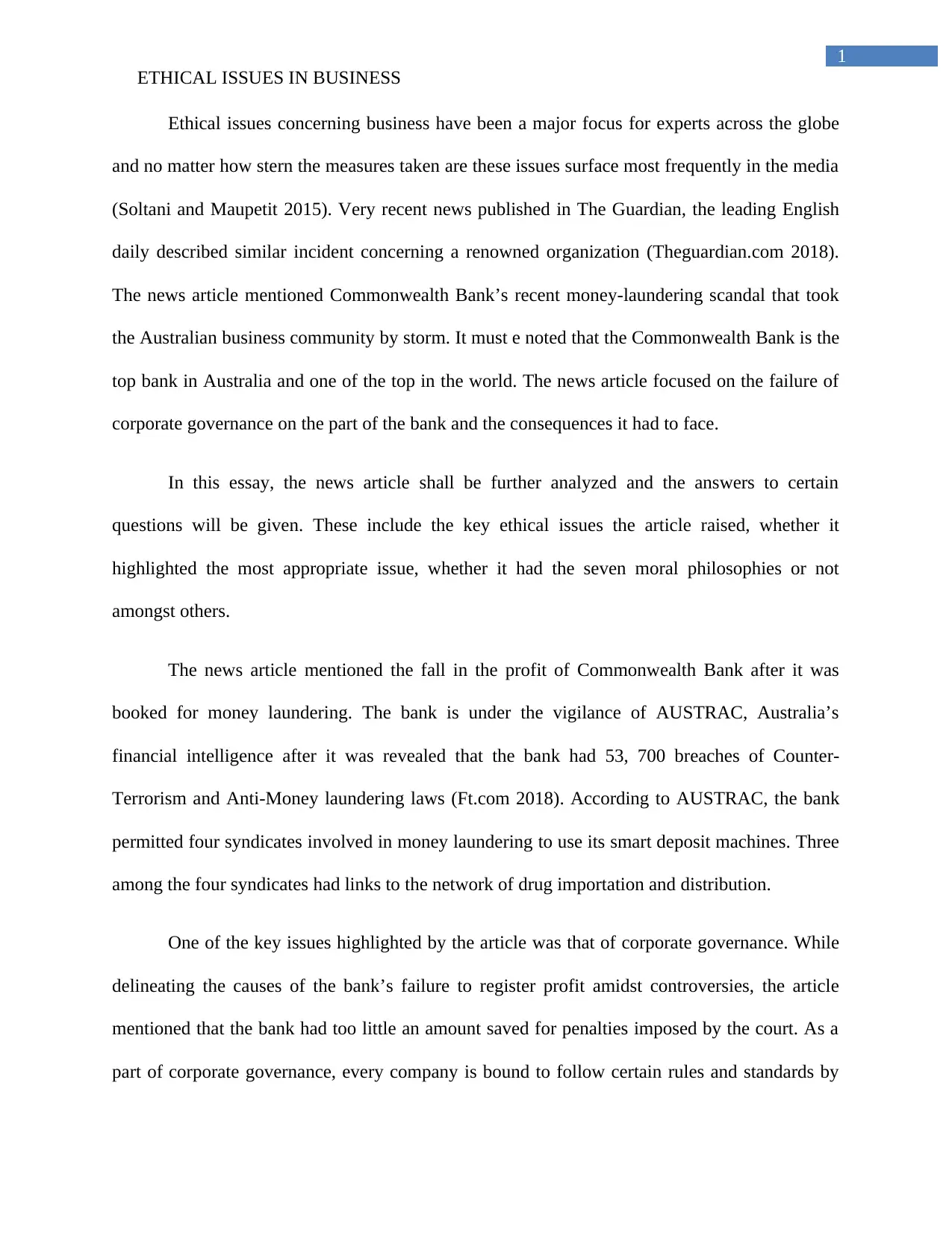
1
ETHICAL ISSUES IN BUSINESS
Ethical issues concerning business have been a major focus for experts across the globe
and no matter how stern the measures taken are these issues surface most frequently in the media
(Soltani and Maupetit 2015). Very recent news published in The Guardian, the leading English
daily described similar incident concerning a renowned organization (Theguardian.com 2018).
The news article mentioned Commonwealth Bank’s recent money-laundering scandal that took
the Australian business community by storm. It must e noted that the Commonwealth Bank is the
top bank in Australia and one of the top in the world. The news article focused on the failure of
corporate governance on the part of the bank and the consequences it had to face.
In this essay, the news article shall be further analyzed and the answers to certain
questions will be given. These include the key ethical issues the article raised, whether it
highlighted the most appropriate issue, whether it had the seven moral philosophies or not
amongst others.
The news article mentioned the fall in the profit of Commonwealth Bank after it was
booked for money laundering. The bank is under the vigilance of AUSTRAC, Australia’s
financial intelligence after it was revealed that the bank had 53, 700 breaches of Counter-
Terrorism and Anti-Money laundering laws (Ft.com 2018). According to AUSTRAC, the bank
permitted four syndicates involved in money laundering to use its smart deposit machines. Three
among the four syndicates had links to the network of drug importation and distribution.
One of the key issues highlighted by the article was that of corporate governance. While
delineating the causes of the bank’s failure to register profit amidst controversies, the article
mentioned that the bank had too little an amount saved for penalties imposed by the court. As a
part of corporate governance, every company is bound to follow certain rules and standards by
ETHICAL ISSUES IN BUSINESS
Ethical issues concerning business have been a major focus for experts across the globe
and no matter how stern the measures taken are these issues surface most frequently in the media
(Soltani and Maupetit 2015). Very recent news published in The Guardian, the leading English
daily described similar incident concerning a renowned organization (Theguardian.com 2018).
The news article mentioned Commonwealth Bank’s recent money-laundering scandal that took
the Australian business community by storm. It must e noted that the Commonwealth Bank is the
top bank in Australia and one of the top in the world. The news article focused on the failure of
corporate governance on the part of the bank and the consequences it had to face.
In this essay, the news article shall be further analyzed and the answers to certain
questions will be given. These include the key ethical issues the article raised, whether it
highlighted the most appropriate issue, whether it had the seven moral philosophies or not
amongst others.
The news article mentioned the fall in the profit of Commonwealth Bank after it was
booked for money laundering. The bank is under the vigilance of AUSTRAC, Australia’s
financial intelligence after it was revealed that the bank had 53, 700 breaches of Counter-
Terrorism and Anti-Money laundering laws (Ft.com 2018). According to AUSTRAC, the bank
permitted four syndicates involved in money laundering to use its smart deposit machines. Three
among the four syndicates had links to the network of drug importation and distribution.
One of the key issues highlighted by the article was that of corporate governance. While
delineating the causes of the bank’s failure to register profit amidst controversies, the article
mentioned that the bank had too little an amount saved for penalties imposed by the court. As a
part of corporate governance, every company is bound to follow certain rules and standards by
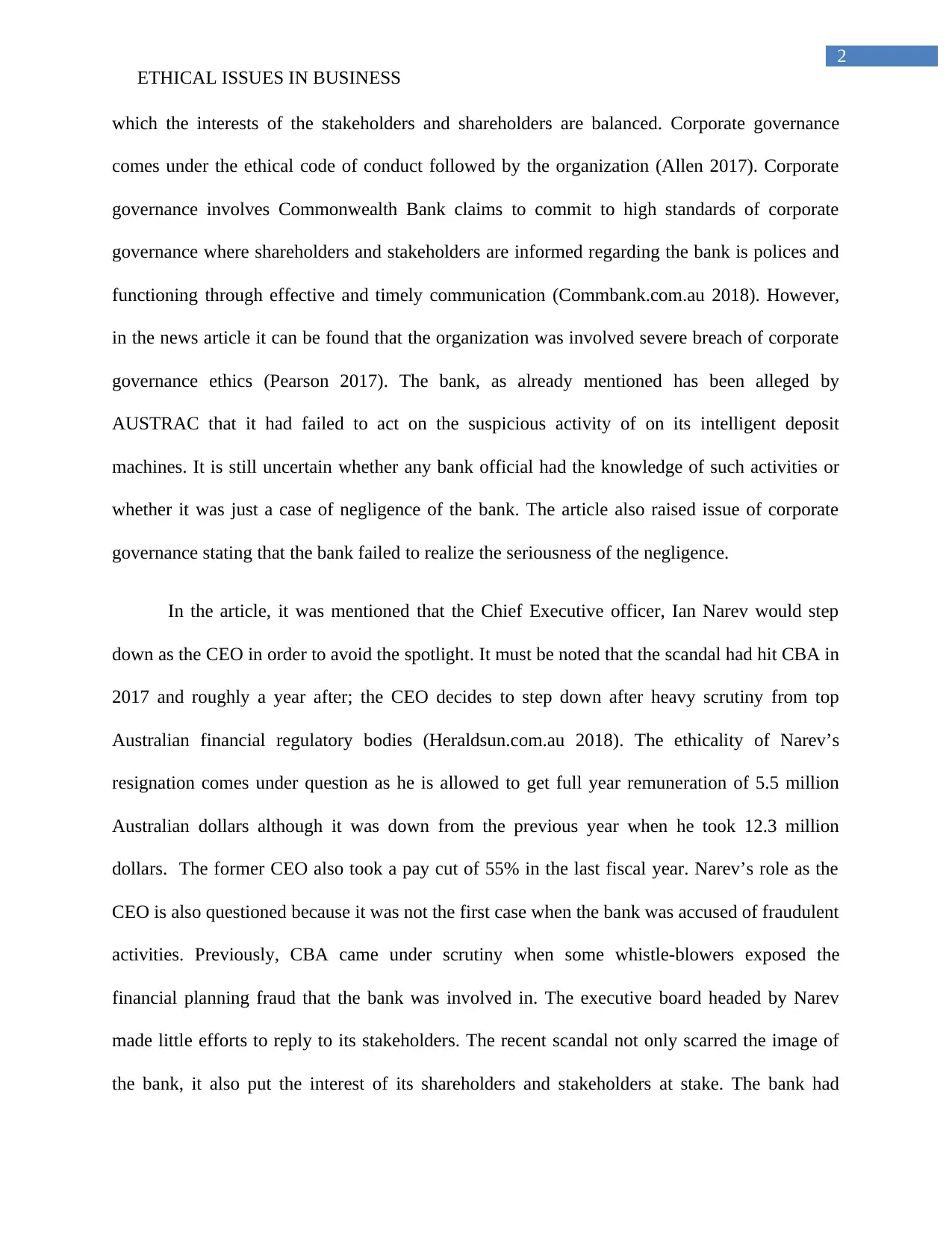
2
ETHICAL ISSUES IN BUSINESS
which the interests of the stakeholders and shareholders are balanced. Corporate governance
comes under the ethical code of conduct followed by the organization (Allen 2017). Corporate
governance involves Commonwealth Bank claims to commit to high standards of corporate
governance where shareholders and stakeholders are informed regarding the bank is polices and
functioning through effective and timely communication (Commbank.com.au 2018). However,
in the news article it can be found that the organization was involved severe breach of corporate
governance ethics (Pearson 2017). The bank, as already mentioned has been alleged by
AUSTRAC that it had failed to act on the suspicious activity of on its intelligent deposit
machines. It is still uncertain whether any bank official had the knowledge of such activities or
whether it was just a case of negligence of the bank. The article also raised issue of corporate
governance stating that the bank failed to realize the seriousness of the negligence.
In the article, it was mentioned that the Chief Executive officer, Ian Narev would step
down as the CEO in order to avoid the spotlight. It must be noted that the scandal had hit CBA in
2017 and roughly a year after; the CEO decides to step down after heavy scrutiny from top
Australian financial regulatory bodies (Heraldsun.com.au 2018). The ethicality of Narev’s
resignation comes under question as he is allowed to get full year remuneration of 5.5 million
Australian dollars although it was down from the previous year when he took 12.3 million
dollars. The former CEO also took a pay cut of 55% in the last fiscal year. Narev’s role as the
CEO is also questioned because it was not the first case when the bank was accused of fraudulent
activities. Previously, CBA came under scrutiny when some whistle-blowers exposed the
financial planning fraud that the bank was involved in. The executive board headed by Narev
made little efforts to reply to its stakeholders. The recent scandal not only scarred the image of
the bank, it also put the interest of its shareholders and stakeholders at stake. The bank had
ETHICAL ISSUES IN BUSINESS
which the interests of the stakeholders and shareholders are balanced. Corporate governance
comes under the ethical code of conduct followed by the organization (Allen 2017). Corporate
governance involves Commonwealth Bank claims to commit to high standards of corporate
governance where shareholders and stakeholders are informed regarding the bank is polices and
functioning through effective and timely communication (Commbank.com.au 2018). However,
in the news article it can be found that the organization was involved severe breach of corporate
governance ethics (Pearson 2017). The bank, as already mentioned has been alleged by
AUSTRAC that it had failed to act on the suspicious activity of on its intelligent deposit
machines. It is still uncertain whether any bank official had the knowledge of such activities or
whether it was just a case of negligence of the bank. The article also raised issue of corporate
governance stating that the bank failed to realize the seriousness of the negligence.
In the article, it was mentioned that the Chief Executive officer, Ian Narev would step
down as the CEO in order to avoid the spotlight. It must be noted that the scandal had hit CBA in
2017 and roughly a year after; the CEO decides to step down after heavy scrutiny from top
Australian financial regulatory bodies (Heraldsun.com.au 2018). The ethicality of Narev’s
resignation comes under question as he is allowed to get full year remuneration of 5.5 million
Australian dollars although it was down from the previous year when he took 12.3 million
dollars. The former CEO also took a pay cut of 55% in the last fiscal year. Narev’s role as the
CEO is also questioned because it was not the first case when the bank was accused of fraudulent
activities. Previously, CBA came under scrutiny when some whistle-blowers exposed the
financial planning fraud that the bank was involved in. The executive board headed by Narev
made little efforts to reply to its stakeholders. The recent scandal not only scarred the image of
the bank, it also put the interest of its shareholders and stakeholders at stake. The bank had
⊘ This is a preview!⊘
Do you want full access?
Subscribe today to unlock all pages.

Trusted by 1+ million students worldwide
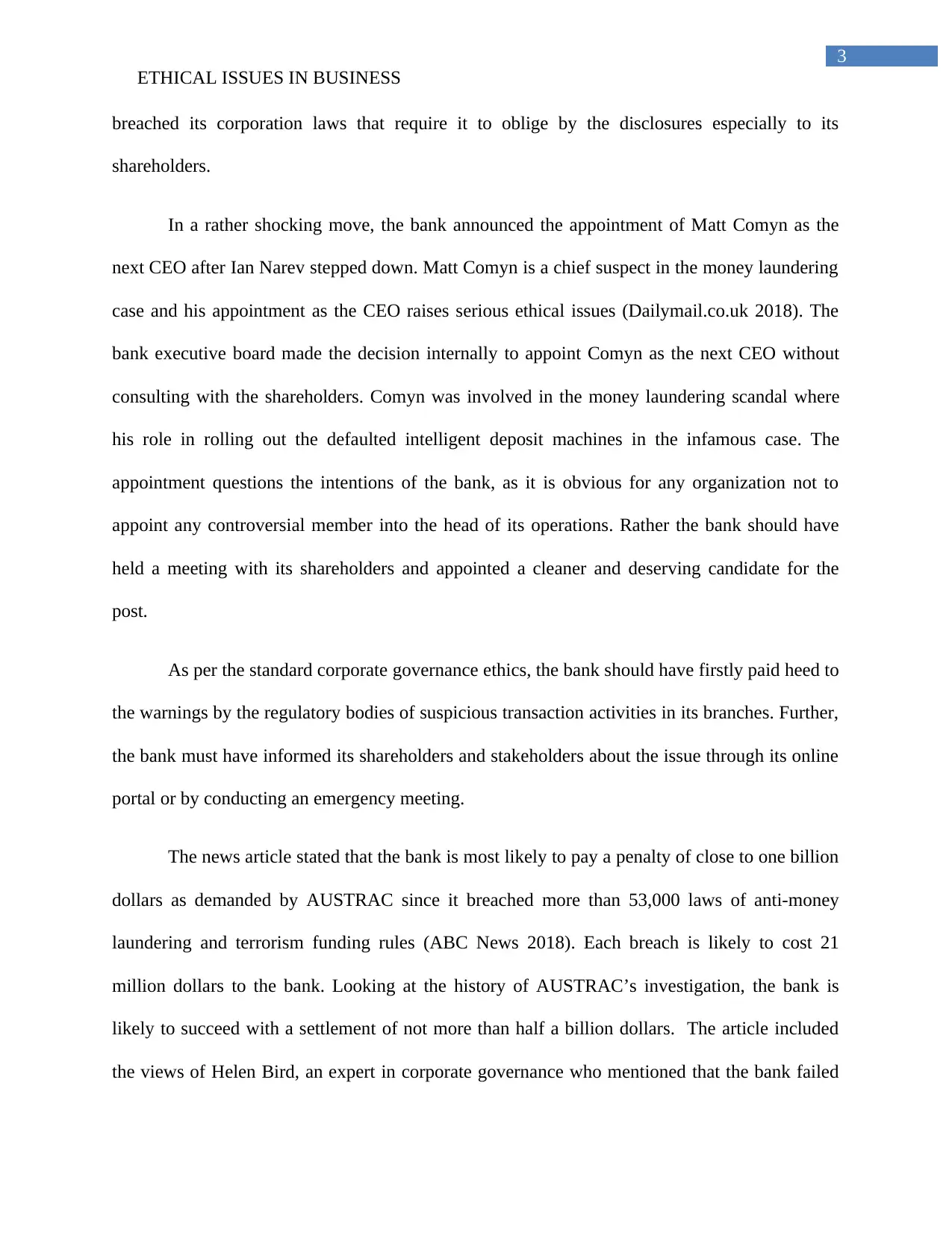
3
ETHICAL ISSUES IN BUSINESS
breached its corporation laws that require it to oblige by the disclosures especially to its
shareholders.
In a rather shocking move, the bank announced the appointment of Matt Comyn as the
next CEO after Ian Narev stepped down. Matt Comyn is a chief suspect in the money laundering
case and his appointment as the CEO raises serious ethical issues (Dailymail.co.uk 2018). The
bank executive board made the decision internally to appoint Comyn as the next CEO without
consulting with the shareholders. Comyn was involved in the money laundering scandal where
his role in rolling out the defaulted intelligent deposit machines in the infamous case. The
appointment questions the intentions of the bank, as it is obvious for any organization not to
appoint any controversial member into the head of its operations. Rather the bank should have
held a meeting with its shareholders and appointed a cleaner and deserving candidate for the
post.
As per the standard corporate governance ethics, the bank should have firstly paid heed to
the warnings by the regulatory bodies of suspicious transaction activities in its branches. Further,
the bank must have informed its shareholders and stakeholders about the issue through its online
portal or by conducting an emergency meeting.
The news article stated that the bank is most likely to pay a penalty of close to one billion
dollars as demanded by AUSTRAC since it breached more than 53,000 laws of anti-money
laundering and terrorism funding rules (ABC News 2018). Each breach is likely to cost 21
million dollars to the bank. Looking at the history of AUSTRAC’s investigation, the bank is
likely to succeed with a settlement of not more than half a billion dollars. The article included
the views of Helen Bird, an expert in corporate governance who mentioned that the bank failed
ETHICAL ISSUES IN BUSINESS
breached its corporation laws that require it to oblige by the disclosures especially to its
shareholders.
In a rather shocking move, the bank announced the appointment of Matt Comyn as the
next CEO after Ian Narev stepped down. Matt Comyn is a chief suspect in the money laundering
case and his appointment as the CEO raises serious ethical issues (Dailymail.co.uk 2018). The
bank executive board made the decision internally to appoint Comyn as the next CEO without
consulting with the shareholders. Comyn was involved in the money laundering scandal where
his role in rolling out the defaulted intelligent deposit machines in the infamous case. The
appointment questions the intentions of the bank, as it is obvious for any organization not to
appoint any controversial member into the head of its operations. Rather the bank should have
held a meeting with its shareholders and appointed a cleaner and deserving candidate for the
post.
As per the standard corporate governance ethics, the bank should have firstly paid heed to
the warnings by the regulatory bodies of suspicious transaction activities in its branches. Further,
the bank must have informed its shareholders and stakeholders about the issue through its online
portal or by conducting an emergency meeting.
The news article stated that the bank is most likely to pay a penalty of close to one billion
dollars as demanded by AUSTRAC since it breached more than 53,000 laws of anti-money
laundering and terrorism funding rules (ABC News 2018). Each breach is likely to cost 21
million dollars to the bank. Looking at the history of AUSTRAC’s investigation, the bank is
likely to succeed with a settlement of not more than half a billion dollars. The article included
the views of Helen Bird, an expert in corporate governance who mentioned that the bank failed
Paraphrase This Document
Need a fresh take? Get an instant paraphrase of this document with our AI Paraphraser
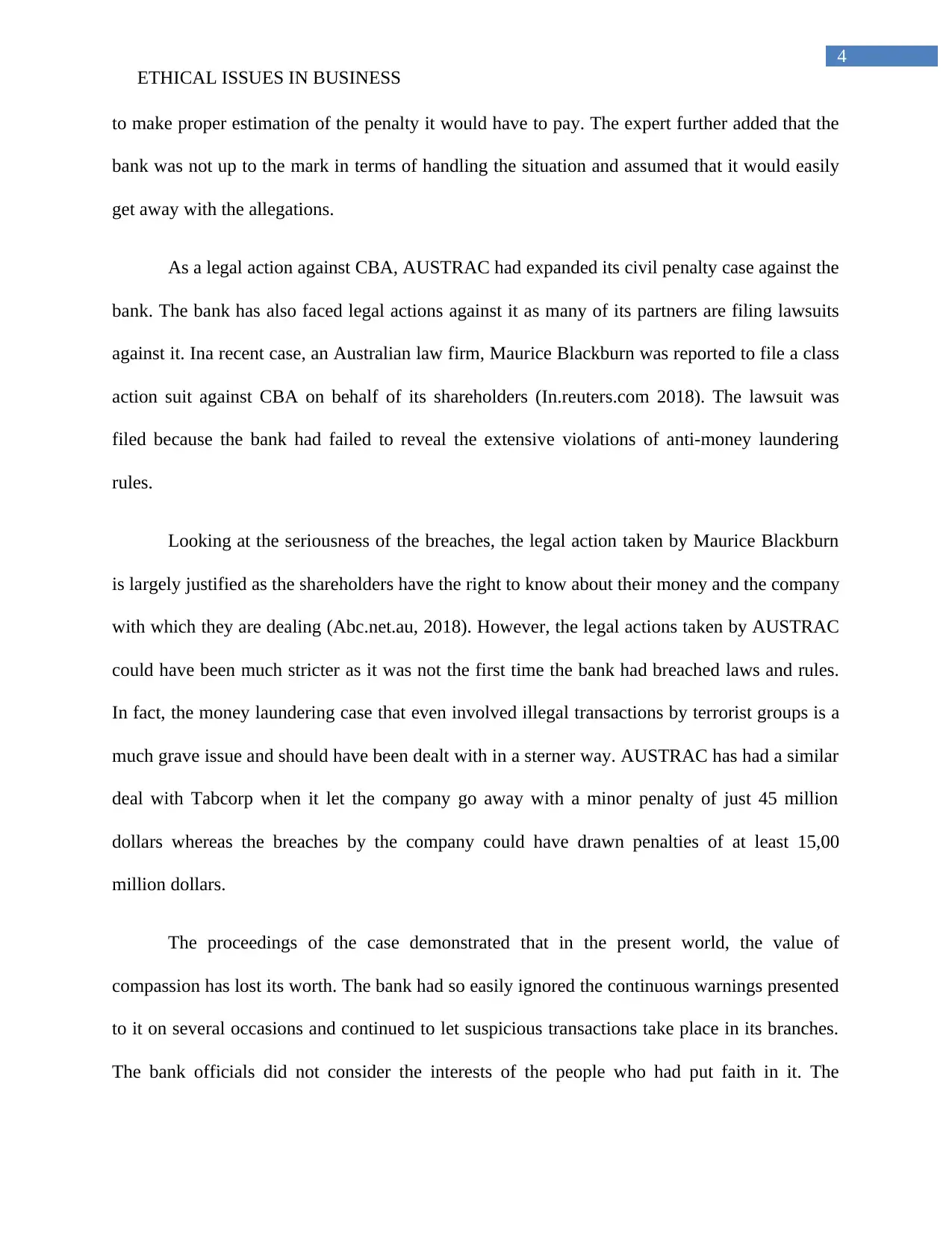
4
ETHICAL ISSUES IN BUSINESS
to make proper estimation of the penalty it would have to pay. The expert further added that the
bank was not up to the mark in terms of handling the situation and assumed that it would easily
get away with the allegations.
As a legal action against CBA, AUSTRAC had expanded its civil penalty case against the
bank. The bank has also faced legal actions against it as many of its partners are filing lawsuits
against it. Ina recent case, an Australian law firm, Maurice Blackburn was reported to file a class
action suit against CBA on behalf of its shareholders (In.reuters.com 2018). The lawsuit was
filed because the bank had failed to reveal the extensive violations of anti-money laundering
rules.
Looking at the seriousness of the breaches, the legal action taken by Maurice Blackburn
is largely justified as the shareholders have the right to know about their money and the company
with which they are dealing (Abc.net.au, 2018). However, the legal actions taken by AUSTRAC
could have been much stricter as it was not the first time the bank had breached laws and rules.
In fact, the money laundering case that even involved illegal transactions by terrorist groups is a
much grave issue and should have been dealt with in a sterner way. AUSTRAC has had a similar
deal with Tabcorp when it let the company go away with a minor penalty of just 45 million
dollars whereas the breaches by the company could have drawn penalties of at least 15,00
million dollars.
The proceedings of the case demonstrated that in the present world, the value of
compassion has lost its worth. The bank had so easily ignored the continuous warnings presented
to it on several occasions and continued to let suspicious transactions take place in its branches.
The bank officials did not consider the interests of the people who had put faith in it. The
ETHICAL ISSUES IN BUSINESS
to make proper estimation of the penalty it would have to pay. The expert further added that the
bank was not up to the mark in terms of handling the situation and assumed that it would easily
get away with the allegations.
As a legal action against CBA, AUSTRAC had expanded its civil penalty case against the
bank. The bank has also faced legal actions against it as many of its partners are filing lawsuits
against it. Ina recent case, an Australian law firm, Maurice Blackburn was reported to file a class
action suit against CBA on behalf of its shareholders (In.reuters.com 2018). The lawsuit was
filed because the bank had failed to reveal the extensive violations of anti-money laundering
rules.
Looking at the seriousness of the breaches, the legal action taken by Maurice Blackburn
is largely justified as the shareholders have the right to know about their money and the company
with which they are dealing (Abc.net.au, 2018). However, the legal actions taken by AUSTRAC
could have been much stricter as it was not the first time the bank had breached laws and rules.
In fact, the money laundering case that even involved illegal transactions by terrorist groups is a
much grave issue and should have been dealt with in a sterner way. AUSTRAC has had a similar
deal with Tabcorp when it let the company go away with a minor penalty of just 45 million
dollars whereas the breaches by the company could have drawn penalties of at least 15,00
million dollars.
The proceedings of the case demonstrated that in the present world, the value of
compassion has lost its worth. The bank had so easily ignored the continuous warnings presented
to it on several occasions and continued to let suspicious transactions take place in its branches.
The bank officials did not consider the interests of the people who had put faith in it. The
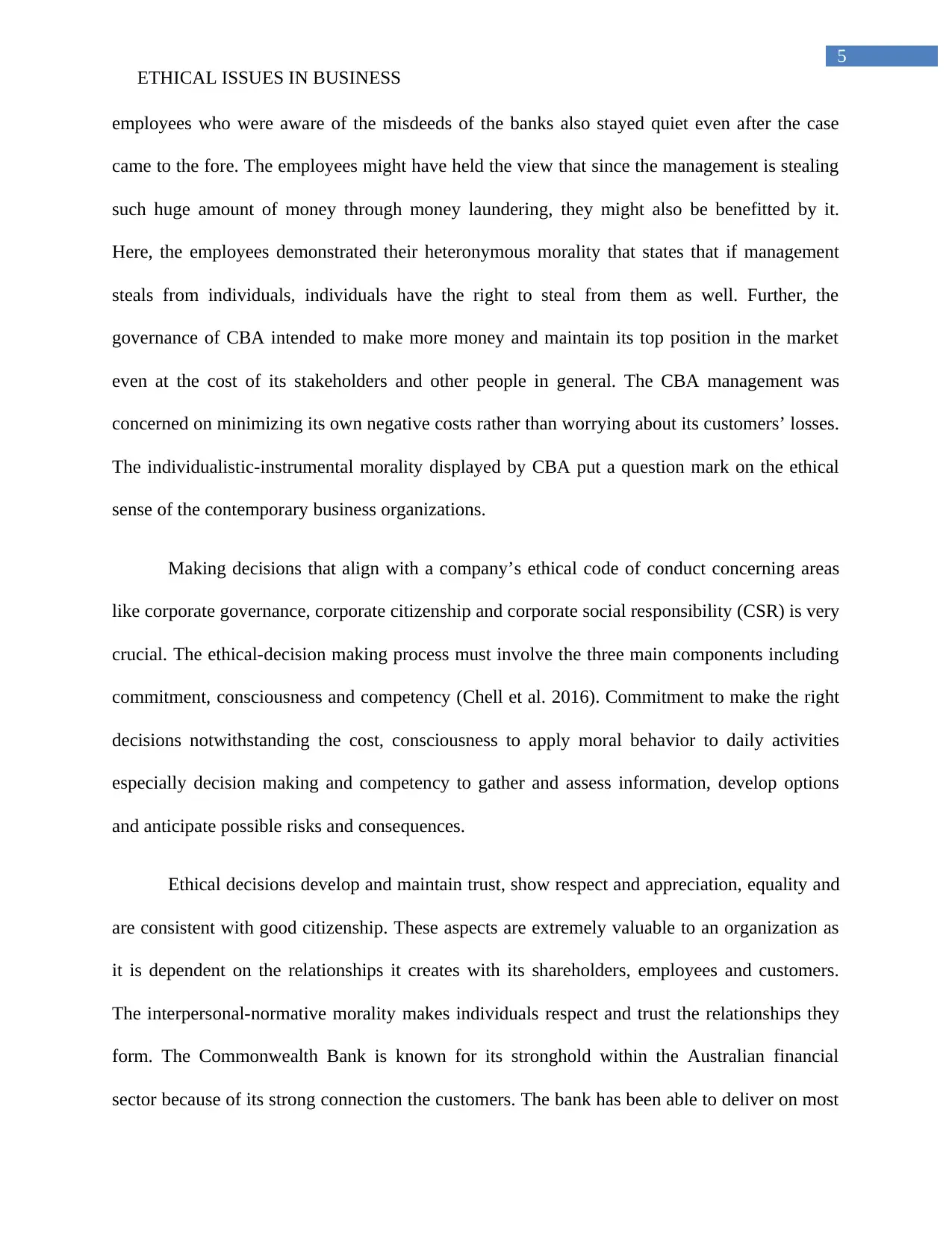
5
ETHICAL ISSUES IN BUSINESS
employees who were aware of the misdeeds of the banks also stayed quiet even after the case
came to the fore. The employees might have held the view that since the management is stealing
such huge amount of money through money laundering, they might also be benefitted by it.
Here, the employees demonstrated their heteronymous morality that states that if management
steals from individuals, individuals have the right to steal from them as well. Further, the
governance of CBA intended to make more money and maintain its top position in the market
even at the cost of its stakeholders and other people in general. The CBA management was
concerned on minimizing its own negative costs rather than worrying about its customers’ losses.
The individualistic-instrumental morality displayed by CBA put a question mark on the ethical
sense of the contemporary business organizations.
Making decisions that align with a company’s ethical code of conduct concerning areas
like corporate governance, corporate citizenship and corporate social responsibility (CSR) is very
crucial. The ethical-decision making process must involve the three main components including
commitment, consciousness and competency (Chell et al. 2016). Commitment to make the right
decisions notwithstanding the cost, consciousness to apply moral behavior to daily activities
especially decision making and competency to gather and assess information, develop options
and anticipate possible risks and consequences.
Ethical decisions develop and maintain trust, show respect and appreciation, equality and
are consistent with good citizenship. These aspects are extremely valuable to an organization as
it is dependent on the relationships it creates with its shareholders, employees and customers.
The interpersonal-normative morality makes individuals respect and trust the relationships they
form. The Commonwealth Bank is known for its stronghold within the Australian financial
sector because of its strong connection the customers. The bank has been able to deliver on most
ETHICAL ISSUES IN BUSINESS
employees who were aware of the misdeeds of the banks also stayed quiet even after the case
came to the fore. The employees might have held the view that since the management is stealing
such huge amount of money through money laundering, they might also be benefitted by it.
Here, the employees demonstrated their heteronymous morality that states that if management
steals from individuals, individuals have the right to steal from them as well. Further, the
governance of CBA intended to make more money and maintain its top position in the market
even at the cost of its stakeholders and other people in general. The CBA management was
concerned on minimizing its own negative costs rather than worrying about its customers’ losses.
The individualistic-instrumental morality displayed by CBA put a question mark on the ethical
sense of the contemporary business organizations.
Making decisions that align with a company’s ethical code of conduct concerning areas
like corporate governance, corporate citizenship and corporate social responsibility (CSR) is very
crucial. The ethical-decision making process must involve the three main components including
commitment, consciousness and competency (Chell et al. 2016). Commitment to make the right
decisions notwithstanding the cost, consciousness to apply moral behavior to daily activities
especially decision making and competency to gather and assess information, develop options
and anticipate possible risks and consequences.
Ethical decisions develop and maintain trust, show respect and appreciation, equality and
are consistent with good citizenship. These aspects are extremely valuable to an organization as
it is dependent on the relationships it creates with its shareholders, employees and customers.
The interpersonal-normative morality makes individuals respect and trust the relationships they
form. The Commonwealth Bank is known for its stronghold within the Australian financial
sector because of its strong connection the customers. The bank has been able to deliver on most
⊘ This is a preview!⊘
Do you want full access?
Subscribe today to unlock all pages.

Trusted by 1+ million students worldwide
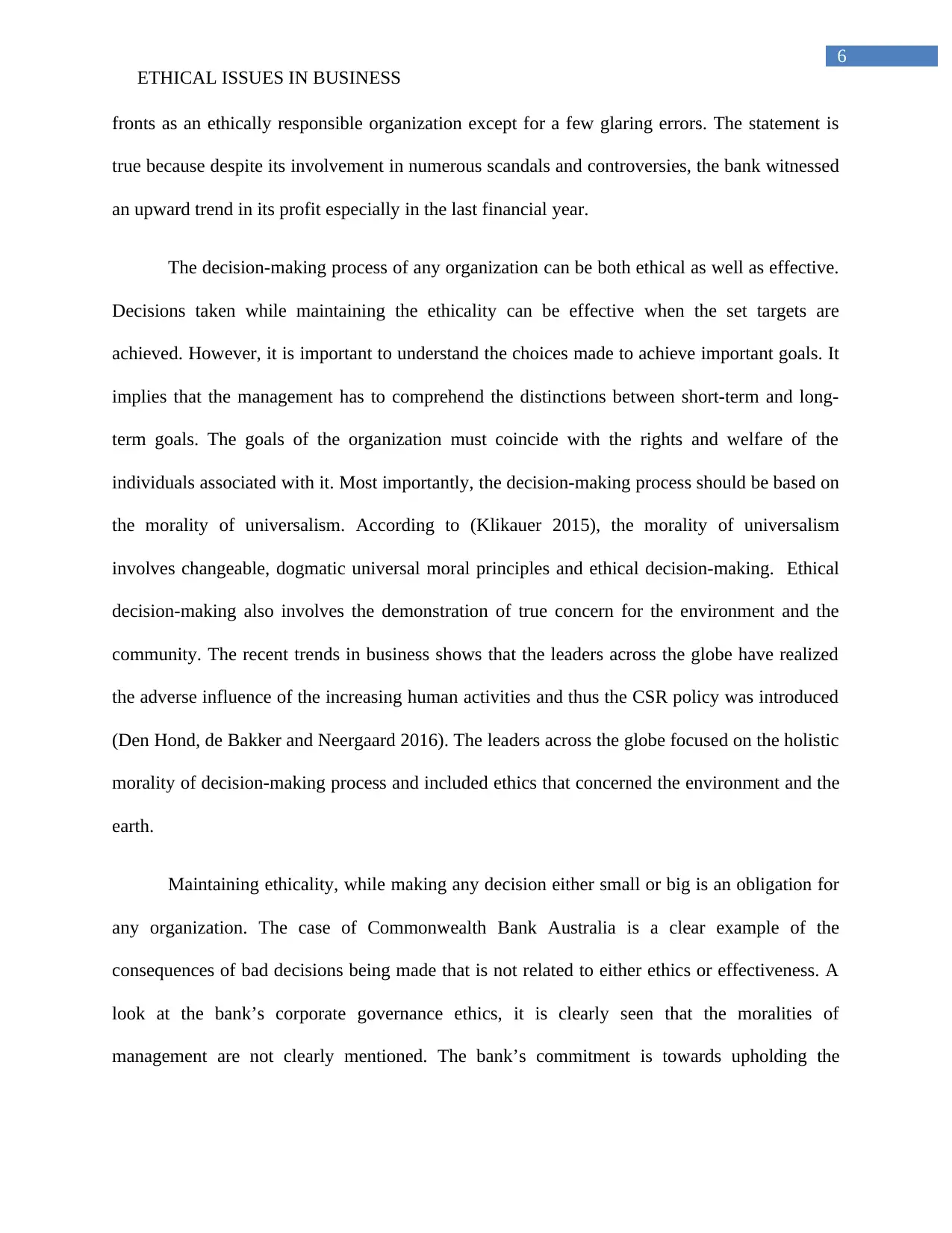
6
ETHICAL ISSUES IN BUSINESS
fronts as an ethically responsible organization except for a few glaring errors. The statement is
true because despite its involvement in numerous scandals and controversies, the bank witnessed
an upward trend in its profit especially in the last financial year.
The decision-making process of any organization can be both ethical as well as effective.
Decisions taken while maintaining the ethicality can be effective when the set targets are
achieved. However, it is important to understand the choices made to achieve important goals. It
implies that the management has to comprehend the distinctions between short-term and long-
term goals. The goals of the organization must coincide with the rights and welfare of the
individuals associated with it. Most importantly, the decision-making process should be based on
the morality of universalism. According to (Klikauer 2015), the morality of universalism
involves changeable, dogmatic universal moral principles and ethical decision-making. Ethical
decision-making also involves the demonstration of true concern for the environment and the
community. The recent trends in business shows that the leaders across the globe have realized
the adverse influence of the increasing human activities and thus the CSR policy was introduced
(Den Hond, de Bakker and Neergaard 2016). The leaders across the globe focused on the holistic
morality of decision-making process and included ethics that concerned the environment and the
earth.
Maintaining ethicality, while making any decision either small or big is an obligation for
any organization. The case of Commonwealth Bank Australia is a clear example of the
consequences of bad decisions being made that is not related to either ethics or effectiveness. A
look at the bank’s corporate governance ethics, it is clearly seen that the moralities of
management are not clearly mentioned. The bank’s commitment is towards upholding the
ETHICAL ISSUES IN BUSINESS
fronts as an ethically responsible organization except for a few glaring errors. The statement is
true because despite its involvement in numerous scandals and controversies, the bank witnessed
an upward trend in its profit especially in the last financial year.
The decision-making process of any organization can be both ethical as well as effective.
Decisions taken while maintaining the ethicality can be effective when the set targets are
achieved. However, it is important to understand the choices made to achieve important goals. It
implies that the management has to comprehend the distinctions between short-term and long-
term goals. The goals of the organization must coincide with the rights and welfare of the
individuals associated with it. Most importantly, the decision-making process should be based on
the morality of universalism. According to (Klikauer 2015), the morality of universalism
involves changeable, dogmatic universal moral principles and ethical decision-making. Ethical
decision-making also involves the demonstration of true concern for the environment and the
community. The recent trends in business shows that the leaders across the globe have realized
the adverse influence of the increasing human activities and thus the CSR policy was introduced
(Den Hond, de Bakker and Neergaard 2016). The leaders across the globe focused on the holistic
morality of decision-making process and included ethics that concerned the environment and the
earth.
Maintaining ethicality, while making any decision either small or big is an obligation for
any organization. The case of Commonwealth Bank Australia is a clear example of the
consequences of bad decisions being made that is not related to either ethics or effectiveness. A
look at the bank’s corporate governance ethics, it is clearly seen that the moralities of
management are not clearly mentioned. The bank’s commitment is towards upholding the
Paraphrase This Document
Need a fresh take? Get an instant paraphrase of this document with our AI Paraphraser
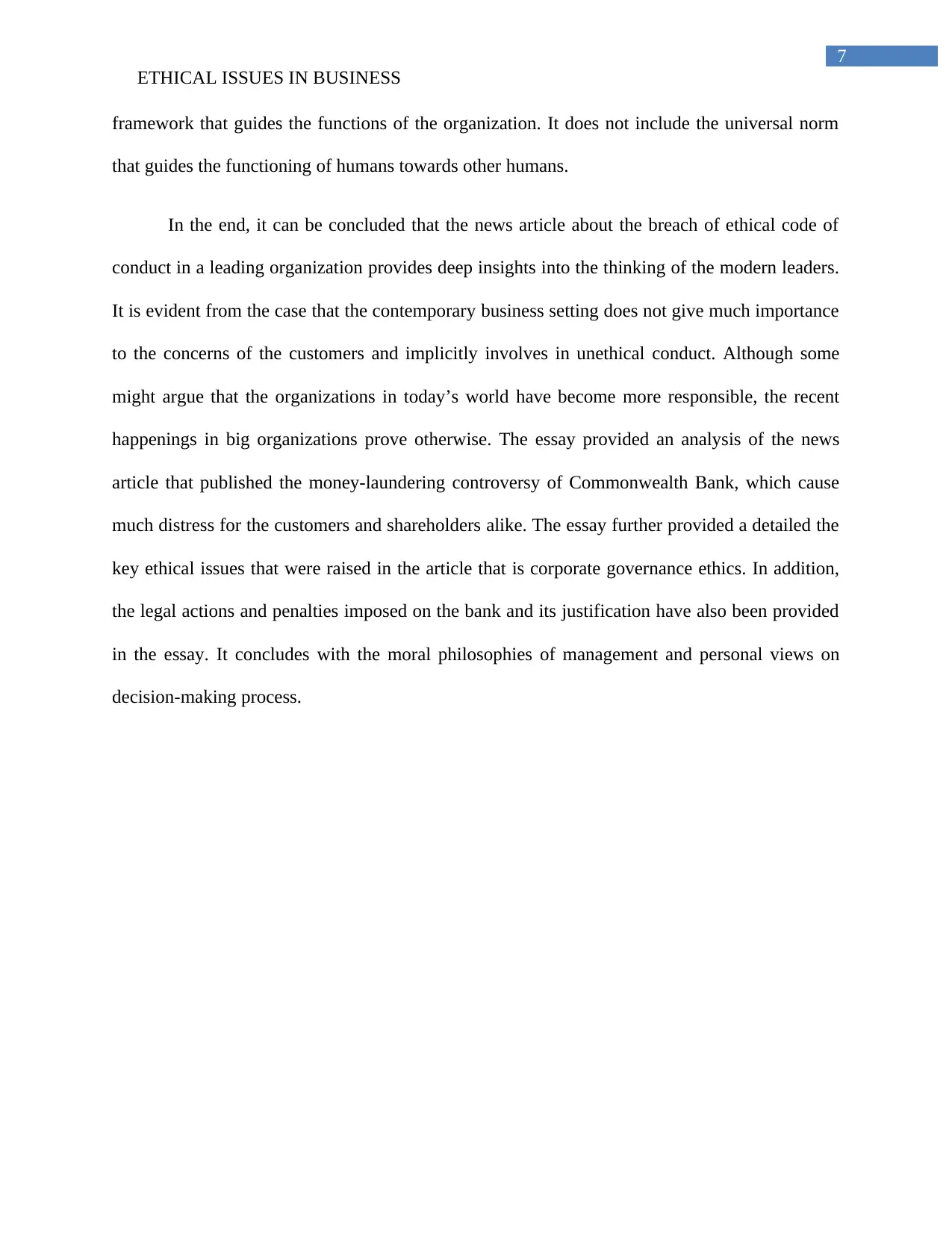
7
ETHICAL ISSUES IN BUSINESS
framework that guides the functions of the organization. It does not include the universal norm
that guides the functioning of humans towards other humans.
In the end, it can be concluded that the news article about the breach of ethical code of
conduct in a leading organization provides deep insights into the thinking of the modern leaders.
It is evident from the case that the contemporary business setting does not give much importance
to the concerns of the customers and implicitly involves in unethical conduct. Although some
might argue that the organizations in today’s world have become more responsible, the recent
happenings in big organizations prove otherwise. The essay provided an analysis of the news
article that published the money-laundering controversy of Commonwealth Bank, which cause
much distress for the customers and shareholders alike. The essay further provided a detailed the
key ethical issues that were raised in the article that is corporate governance ethics. In addition,
the legal actions and penalties imposed on the bank and its justification have also been provided
in the essay. It concludes with the moral philosophies of management and personal views on
decision-making process.
ETHICAL ISSUES IN BUSINESS
framework that guides the functions of the organization. It does not include the universal norm
that guides the functioning of humans towards other humans.
In the end, it can be concluded that the news article about the breach of ethical code of
conduct in a leading organization provides deep insights into the thinking of the modern leaders.
It is evident from the case that the contemporary business setting does not give much importance
to the concerns of the customers and implicitly involves in unethical conduct. Although some
might argue that the organizations in today’s world have become more responsible, the recent
happenings in big organizations prove otherwise. The essay provided an analysis of the news
article that published the money-laundering controversy of Commonwealth Bank, which cause
much distress for the customers and shareholders alike. The essay further provided a detailed the
key ethical issues that were raised in the article that is corporate governance ethics. In addition,
the legal actions and penalties imposed on the bank and its justification have also been provided
in the essay. It concludes with the moral philosophies of management and personal views on
decision-making process.
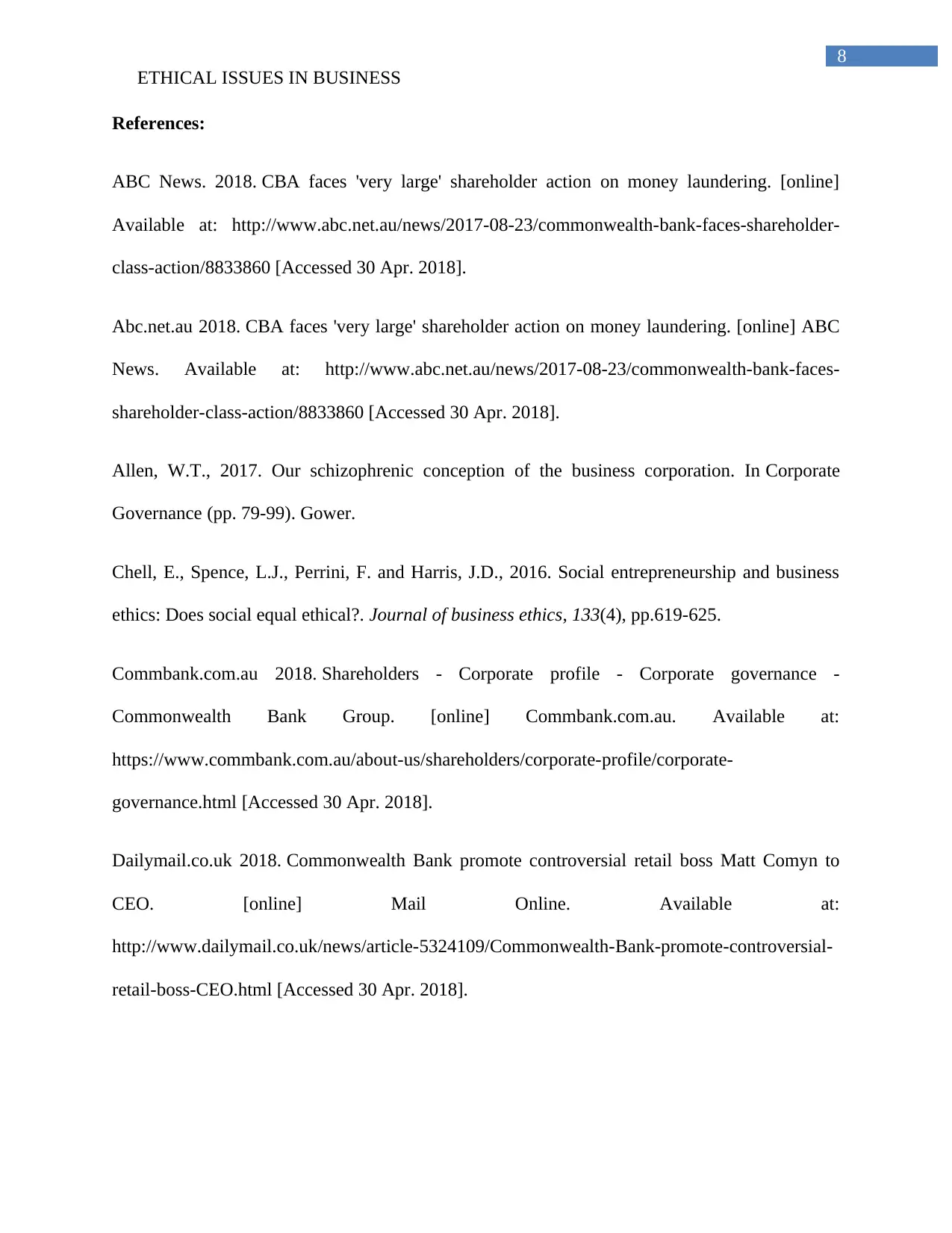
8
ETHICAL ISSUES IN BUSINESS
References:
ABC News. 2018. CBA faces 'very large' shareholder action on money laundering. [online]
Available at: http://www.abc.net.au/news/2017-08-23/commonwealth-bank-faces-shareholder-
class-action/8833860 [Accessed 30 Apr. 2018].
Abc.net.au 2018. CBA faces 'very large' shareholder action on money laundering. [online] ABC
News. Available at: http://www.abc.net.au/news/2017-08-23/commonwealth-bank-faces-
shareholder-class-action/8833860 [Accessed 30 Apr. 2018].
Allen, W.T., 2017. Our schizophrenic conception of the business corporation. In Corporate
Governance (pp. 79-99). Gower.
Chell, E., Spence, L.J., Perrini, F. and Harris, J.D., 2016. Social entrepreneurship and business
ethics: Does social equal ethical?. Journal of business ethics, 133(4), pp.619-625.
Commbank.com.au 2018. Shareholders - Corporate profile - Corporate governance -
Commonwealth Bank Group. [online] Commbank.com.au. Available at:
https://www.commbank.com.au/about-us/shareholders/corporate-profile/corporate-
governance.html [Accessed 30 Apr. 2018].
Dailymail.co.uk 2018. Commonwealth Bank promote controversial retail boss Matt Comyn to
CEO. [online] Mail Online. Available at:
http://www.dailymail.co.uk/news/article-5324109/Commonwealth-Bank-promote-controversial-
retail-boss-CEO.html [Accessed 30 Apr. 2018].
ETHICAL ISSUES IN BUSINESS
References:
ABC News. 2018. CBA faces 'very large' shareholder action on money laundering. [online]
Available at: http://www.abc.net.au/news/2017-08-23/commonwealth-bank-faces-shareholder-
class-action/8833860 [Accessed 30 Apr. 2018].
Abc.net.au 2018. CBA faces 'very large' shareholder action on money laundering. [online] ABC
News. Available at: http://www.abc.net.au/news/2017-08-23/commonwealth-bank-faces-
shareholder-class-action/8833860 [Accessed 30 Apr. 2018].
Allen, W.T., 2017. Our schizophrenic conception of the business corporation. In Corporate
Governance (pp. 79-99). Gower.
Chell, E., Spence, L.J., Perrini, F. and Harris, J.D., 2016. Social entrepreneurship and business
ethics: Does social equal ethical?. Journal of business ethics, 133(4), pp.619-625.
Commbank.com.au 2018. Shareholders - Corporate profile - Corporate governance -
Commonwealth Bank Group. [online] Commbank.com.au. Available at:
https://www.commbank.com.au/about-us/shareholders/corporate-profile/corporate-
governance.html [Accessed 30 Apr. 2018].
Dailymail.co.uk 2018. Commonwealth Bank promote controversial retail boss Matt Comyn to
CEO. [online] Mail Online. Available at:
http://www.dailymail.co.uk/news/article-5324109/Commonwealth-Bank-promote-controversial-
retail-boss-CEO.html [Accessed 30 Apr. 2018].
⊘ This is a preview!⊘
Do you want full access?
Subscribe today to unlock all pages.

Trusted by 1+ million students worldwide
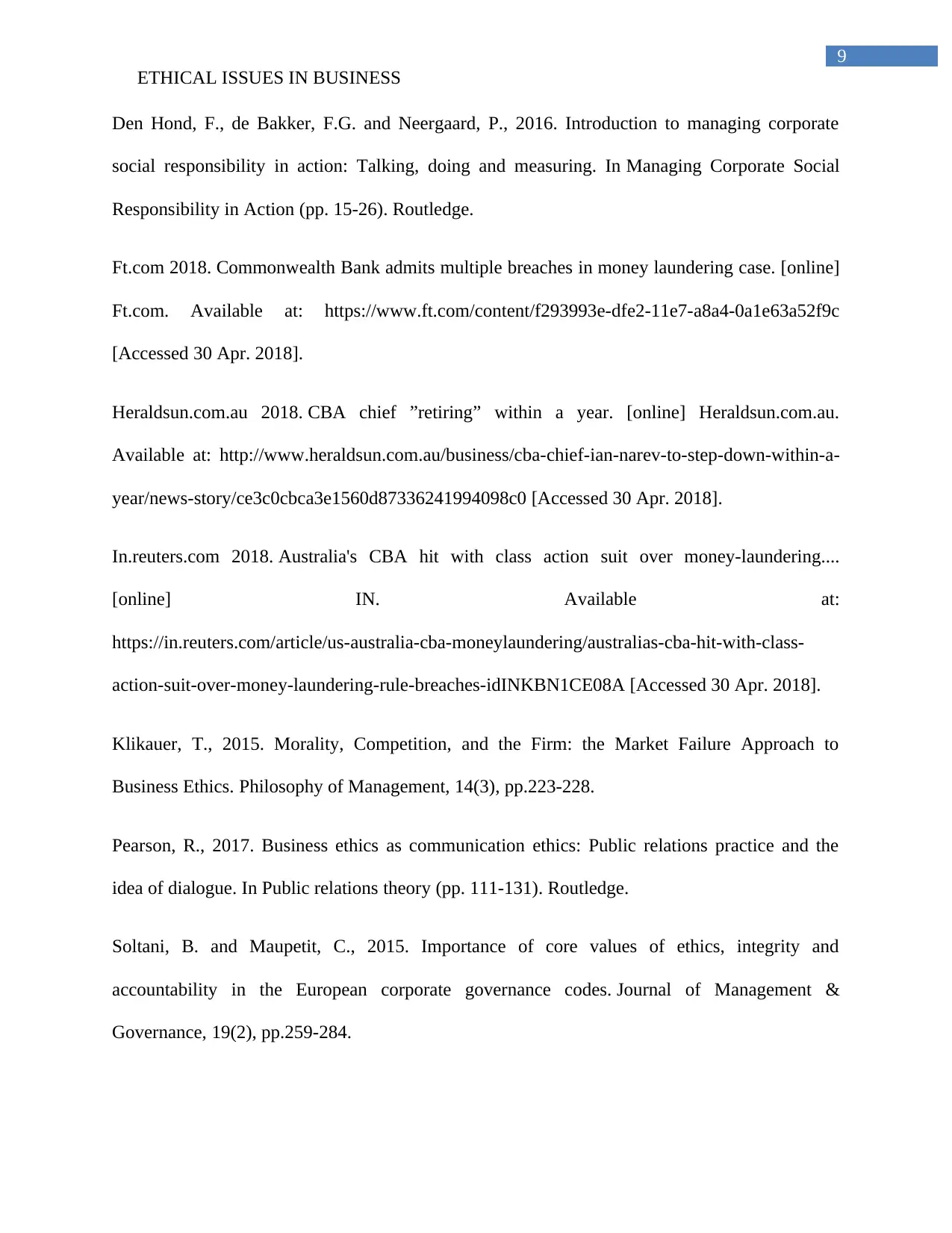
9
ETHICAL ISSUES IN BUSINESS
Den Hond, F., de Bakker, F.G. and Neergaard, P., 2016. Introduction to managing corporate
social responsibility in action: Talking, doing and measuring. In Managing Corporate Social
Responsibility in Action (pp. 15-26). Routledge.
Ft.com 2018. Commonwealth Bank admits multiple breaches in money laundering case. [online]
Ft.com. Available at: https://www.ft.com/content/f293993e-dfe2-11e7-a8a4-0a1e63a52f9c
[Accessed 30 Apr. 2018].
Heraldsun.com.au 2018. CBA chief ”retiring” within a year. [online] Heraldsun.com.au.
Available at: http://www.heraldsun.com.au/business/cba-chief-ian-narev-to-step-down-within-a-
year/news-story/ce3c0cbca3e1560d87336241994098c0 [Accessed 30 Apr. 2018].
In.reuters.com 2018. Australia's CBA hit with class action suit over money-laundering....
[online] IN. Available at:
https://in.reuters.com/article/us-australia-cba-moneylaundering/australias-cba-hit-with-class-
action-suit-over-money-laundering-rule-breaches-idINKBN1CE08A [Accessed 30 Apr. 2018].
Klikauer, T., 2015. Morality, Competition, and the Firm: the Market Failure Approach to
Business Ethics. Philosophy of Management, 14(3), pp.223-228.
Pearson, R., 2017. Business ethics as communication ethics: Public relations practice and the
idea of dialogue. In Public relations theory (pp. 111-131). Routledge.
Soltani, B. and Maupetit, C., 2015. Importance of core values of ethics, integrity and
accountability in the European corporate governance codes. Journal of Management &
Governance, 19(2), pp.259-284.
ETHICAL ISSUES IN BUSINESS
Den Hond, F., de Bakker, F.G. and Neergaard, P., 2016. Introduction to managing corporate
social responsibility in action: Talking, doing and measuring. In Managing Corporate Social
Responsibility in Action (pp. 15-26). Routledge.
Ft.com 2018. Commonwealth Bank admits multiple breaches in money laundering case. [online]
Ft.com. Available at: https://www.ft.com/content/f293993e-dfe2-11e7-a8a4-0a1e63a52f9c
[Accessed 30 Apr. 2018].
Heraldsun.com.au 2018. CBA chief ”retiring” within a year. [online] Heraldsun.com.au.
Available at: http://www.heraldsun.com.au/business/cba-chief-ian-narev-to-step-down-within-a-
year/news-story/ce3c0cbca3e1560d87336241994098c0 [Accessed 30 Apr. 2018].
In.reuters.com 2018. Australia's CBA hit with class action suit over money-laundering....
[online] IN. Available at:
https://in.reuters.com/article/us-australia-cba-moneylaundering/australias-cba-hit-with-class-
action-suit-over-money-laundering-rule-breaches-idINKBN1CE08A [Accessed 30 Apr. 2018].
Klikauer, T., 2015. Morality, Competition, and the Firm: the Market Failure Approach to
Business Ethics. Philosophy of Management, 14(3), pp.223-228.
Pearson, R., 2017. Business ethics as communication ethics: Public relations practice and the
idea of dialogue. In Public relations theory (pp. 111-131). Routledge.
Soltani, B. and Maupetit, C., 2015. Importance of core values of ethics, integrity and
accountability in the European corporate governance codes. Journal of Management &
Governance, 19(2), pp.259-284.
Paraphrase This Document
Need a fresh take? Get an instant paraphrase of this document with our AI Paraphraser

10
ETHICAL ISSUES IN BUSINESS
Theguardian.com 2018. Commonwealth Bank profit falls amid money-laundering scandal.
[online] the Guardian. Available at:
https://www.theguardian.com/australia-news/2018/feb/07/commonwealth-bank-profit-falls-
amid-money-laundering-scandal [Accessed 30 Apr. 2018].
ETHICAL ISSUES IN BUSINESS
Theguardian.com 2018. Commonwealth Bank profit falls amid money-laundering scandal.
[online] the Guardian. Available at:
https://www.theguardian.com/australia-news/2018/feb/07/commonwealth-bank-profit-falls-
amid-money-laundering-scandal [Accessed 30 Apr. 2018].
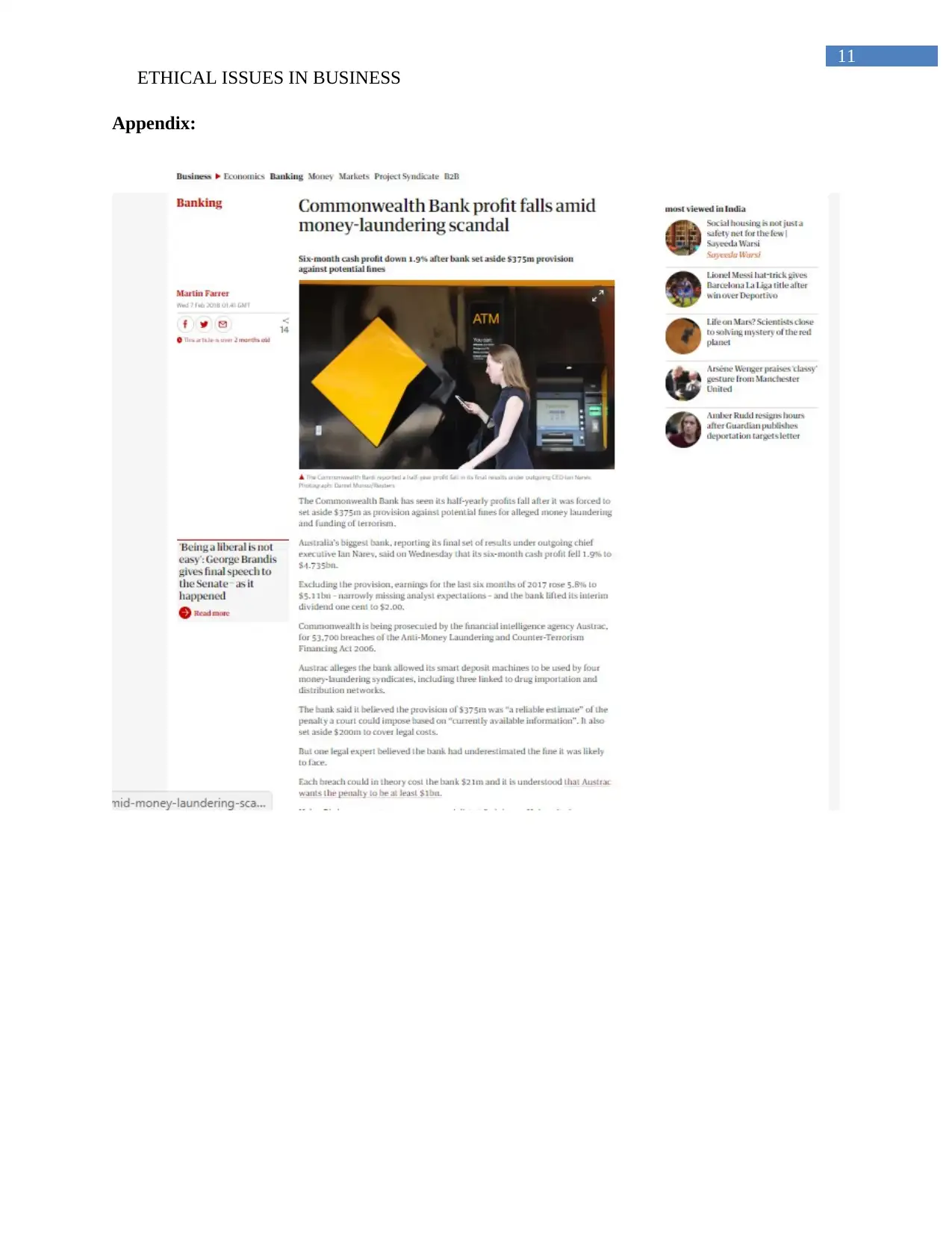
11
ETHICAL ISSUES IN BUSINESS
Appendix:
ETHICAL ISSUES IN BUSINESS
Appendix:
⊘ This is a preview!⊘
Do you want full access?
Subscribe today to unlock all pages.

Trusted by 1+ million students worldwide
1 out of 12
Related Documents
Your All-in-One AI-Powered Toolkit for Academic Success.
+13062052269
info@desklib.com
Available 24*7 on WhatsApp / Email
![[object Object]](/_next/static/media/star-bottom.7253800d.svg)
Unlock your academic potential
Copyright © 2020–2026 A2Z Services. All Rights Reserved. Developed and managed by ZUCOL.





